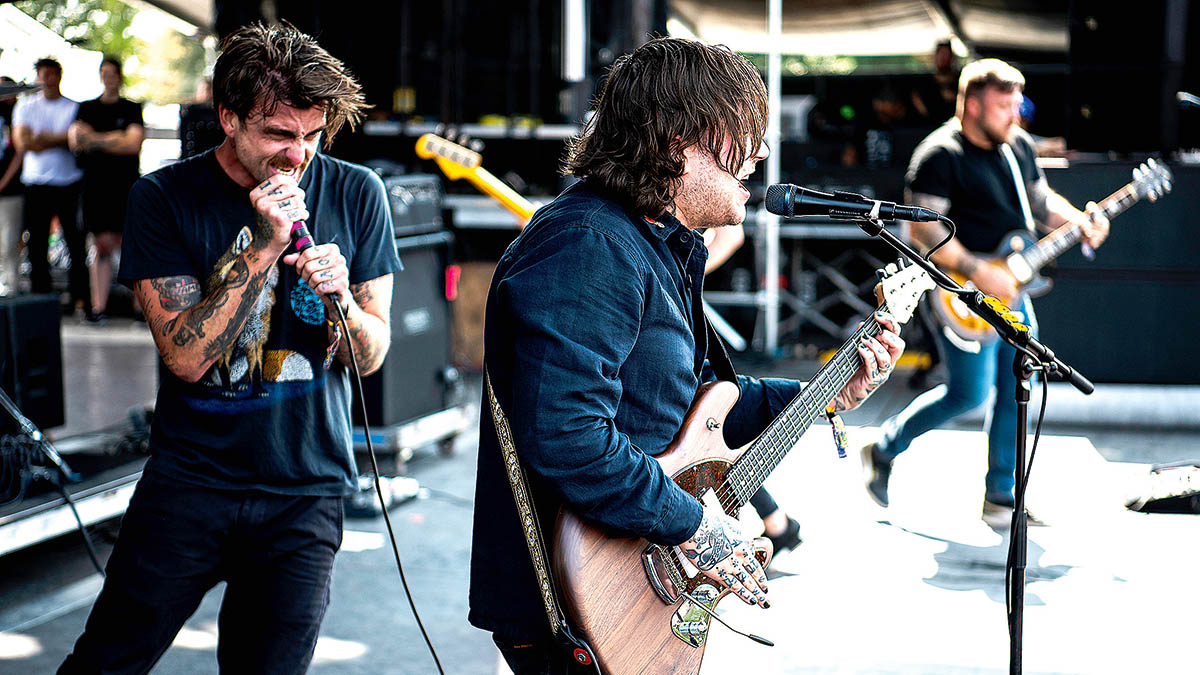Frank Iero and Travis Stever on the tapping, harmonized solos and gear change-ups that fueled post-hardcore supergroup L.S. Dunes' debut
The My Chemical Romance and Coheed and Cambria guitarists talk their newfound chemistry, favorite Klon clones and an all-new Ernie Ball Music Man design that's still under wraps…

All the latest guitar news, interviews, lessons, reviews, deals and more, direct to your inbox!
You are now subscribed
Your newsletter sign-up was successful
Post-hardcore “supergroup” L.S. Dunes represents a meeting of minds between guitarist Frank Iero of My Chemical Romance, guitarist Travis Stever of Coheed and Cambria, vocalist Anthony Green of Circa Survive and bassist Tim Payne and drummer Tucker Rule of Thursday.
As the title of their debut album Past Lives suggests, this is not a complete departure from their main bands, but, as Travis says: “What’s cool about L.S. Dunes is that you can hear everybody’s style peek out. Not once is it dictated by a sound that’s My Chem or Thursday or Coheed, but you hear the styles.”
L.S. Dunes made their live debut at Riot Fest 2022 on the same day that Iero headlined the festival with My Chemical Romance, and he’s since embarked on a lengthy reunion tour with the emo-punk trailblazers. Likewise, Stever remains an active member of Coheed And Cambria, and at the time of this interview we find him on tour in Europe.
Naturally, when a band comes along whose line-up reads like a pick ’n’ mix from the top tier of a festival poster plucked from the post-punk and hardcore boom of the mid-2000s, it’s instinctive to reach for the word ‘supergroup’. Travis contends this is more of an “easy way” to describe L.S. Dunes than a reflection of how the band sees themselves.
“It just seems to reduce it,” he asserts. “We came together because we wanted to make music. There was no expectation of what the music would be, and, as a matter of fact, there was an agreement that if the music wasn’t up to our standards, we’d let it go.”
According to Frank, the project “started very organically,” with a sensation akin to “playing in your first band in high school” – aside from the fact that preliminary writing took place against the backdrop of a global shutdown, so jams were out of the question.
Instead, the five friends-turned-bandmates worked remotely, sending ideas by text and email, before getting together months later for their first in-the-flesh rehearsal in Iero’s basement – ‘The Lab’.
All the latest guitar news, interviews, lessons, reviews, deals and more, direct to your inbox!
“The fun thing about it was that we were all stuck at home, so we were trying new things and getting out of our comfort zones,” he recalls. “Nobody really thought it would go further than that. We finally got in a room together right before we recorded, and that’s when the wheels really started to turn.”
Working with Frank has been an incredibly different but nourishing thing. I’m almost addicted! I’ve found a guitar player and we work well together without really having to talk about it.
Travis Stever
The project has proved a creative revelation for both guitarists. As Travis says, “Working with Frank has been an incredibly different but nourishing thing. I’m almost addicted! I’ve found a guitar player and we work well together without really having to talk about it. That’s very rare.” Frank repays the compliment: “It’s cool to play with people who are different from your upbringing and different from your playing style,” he says. “That’s how you grow, evolve and change.”
Ruminating on exactly how his approach has shifted since the early days, Frank suggests that the biggest factor of all has been ageing. “Your playing style and your approach changes from project to project, but it also changes with your maturity level. Even some of the earlier stuff before My Chem, the kitchen sink was a big thing, as it is for a lot of young players. You need to develop that self-editing process where everything you write doesn’t need to be in the song.”
It’s also worth noting that while Travis is used to holding down the lead guitar role in Coheed And Cambria, and Frank a more traditional rhythm role in MCR, things are more equitably divided up in L.S. Dunes.
“There’s definitely things I did on this record that aren’t in my wheelhouse and aren’t things I would have done in My Chem, and that I’m really proud of,” Frank says, citing the “whammy moment” on It Takes Time and the sensitive composition of 2022 as personal highlights. He also escaped his comfort zone with a tapping element in Like Forever. “I’ve never done that on a record and it’s something I’ve always wanted to try,” he explains. “I’m not that kind of guitarist where I’m always doing tapping solos...”
But with new bands come new opportunities, and as Travis says of Frank’s sometimes underrated chops: “He’s got this primal finesse. Is he appreciated as a guitar player because of the things he’s done in My Chem? Yes; but I think he deserves to be more appreciated. That’s what I like about L.S. Dunes. It’s a bunch of players that I’m proud to be with.”
In the creation of Past Lives, the circumstances of working in separate confines offered some surprising perks. “Doing the writing remotely meant that you heard the tracks in isolation,” Frank says, “and really being able to hear what the other person was doing was a big benefit. Sometimes you’re in a room and everybody’s making noise and it sounds kinda good, but you don’t find out until the recording process that it actually doesn’t work. I’m glad that we had more of a pristine work environment than a random practice studio, especially with how much riffing is happening.”
Likewise, Travis suggests that the record “turned into what it is because of that style of writing,” and a track that both players single out as being representative of this is Blender, which features stunning harmonised guitars that took time, space and reflection to devise.
“It’s probably my favourite song and it was initially just a group of riffs that Frank sent,” says Travis. “On the demos, I had completely different guitar parts. I lived with them for months, and wound up scratching most of them and harmonising what he was playing.”

Travis is no stranger to figuring out harmonies and has done so on numerous Coheed And Cambria tracks. As Frank puts it, “That’s something he’s phenomenal at”. But what makes this example extra cool is that not all of it conforms to expected compositional norms. “If you listen to it with some kind of theory mindframe, a couple of the notes are just octaves,” Travis explains. “The line goes from harmony to octave. I wound up trying everything and that’s where I landed. Having the time to do that was cool.”
Asking the pair if a novel project had necessitated novel adventures in gear elicits a split response. “It always does!” enthuses Frank, while Travis offers a slightly apologetic, “It really didn’t!” He elaborates: “This past couple of years has been a time for me to abandon the ego of thinking I’m going to know what the sound should be. Instead, it’s been about knowing what the melody is, and then wanting somebody to help figure out the sound.”
For the most part, Travis stuck with his trusty Bigsby-fitted Gibson Les Paul Traditional Goldtop, and recorded many of his parts at home using Reason and a selection of plugins, before sending them to producer Will Yip to re-amp.
Sometimes my Bowman overdrive beats my Klon. I’ll always A/B them because sometimes you need the Klon, but the Bowman – holy s**t! I have them on every ’board!
Frank Iero
“Usually, I would be embarrassed to say that, but I’m not!” he laughs. For the title track, he recalls finding a “really weird sound” through one such plugin, which he used for octaving and harmonising his verse guitar part.
To this, he added British overdrive and reverb plugins. Replicating the sound live has proven a little challenging, but he’s found that an Electro-Harmonix Pitch Fork and Highwind Amplification Direwolf Overdrive pedal will do the trick.
Conversely, Frank used a vast array of toys – fed through his Fender Twin – to colour his various guitar sounds. These included a Keeley Synth-1, a Schaffer Replica by SoloDallas for “a bit of extra life in the signal chain”, a Black Math Fuzz, and his secret weapon, a Bowman Audio Endeavors Overdrive.
“Sometimes it beats my Klon,” he raves. “I’ll always A/B them because sometimes you need the Klon, but the Bowman – holy shit! I have them on every ’board!”
Guitar-wise, Frank used everything from his custom long-scale Fender Jaguar to a selection of Ernie Ball Music Man models, as well as an old Harmony that he bought at a garage sale. Perhaps most excitingly of all, since wrapping up recording, Frank has been working on a completely new guitar design with Ernie Ball Music Man.
“It’s incredible,” he smiles. “It’s kind of built off the StingRay, but the pickup configuration is different, with a P-90 in the bridge, a single coil in the middle and a gold foil in the neck, to give a varied array of tones.”
Noting one of the guitar’s slightly more challenging characteristics, he laughs, “It’s also made out of walnut so it’s fucking heavy! I do feel myself getting shorter as I’m playing it, but it has a tone you can’t beat!”
- Past Lives is out now via Fantasy.
Since graduating university with a degree in English, Ellie has spent the last decade working in a variety of media, marketing and live events roles. As well as being a regular contributor to GuitarWorld.com, she currently heads up the marketing team of a mid-scale venue in the south-west of England. She started dabbling with guitars around the age of seven and has been borderline obsessed ever since. She has a particular fascination with alternate tunings, is forever hunting for the perfect slide for the smaller-handed guitarist, and derives a sadistic pleasure from bothering her drummer mates with a preference for wonky time signatures.

